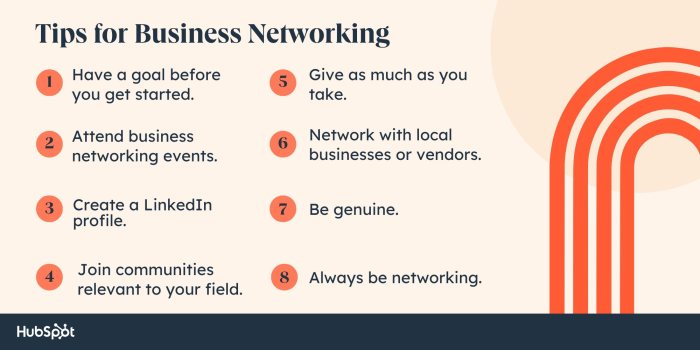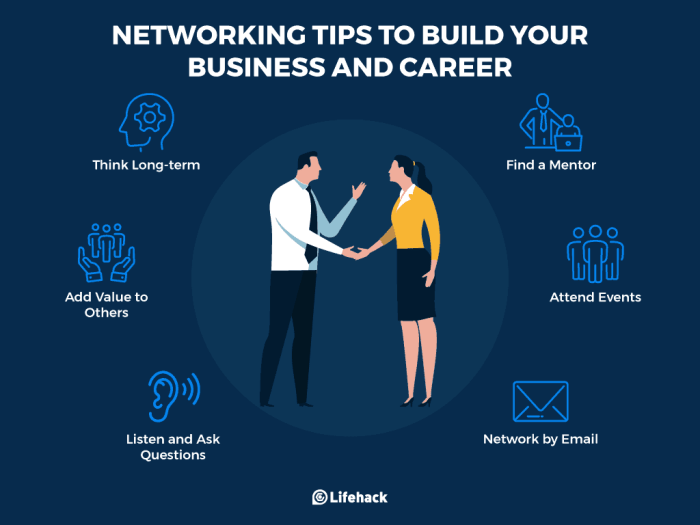Networking Tips for Professionals dives into the significance of building connections in the professional world, offering valuable insights to help individuals navigate the complexities of networking with finesse.
From the importance of networking to effective techniques and leveraging social media, this guide equips professionals with the tools needed to enhance their careers through strategic networking.
Importance of Networking
Networking is crucial for professionals as it provides opportunities to connect with others in the same field, exchange valuable information, and build relationships that can lead to career advancement. By expanding your network, you increase your chances of learning about job openings, gaining insights into industry trends, and receiving mentorship from experienced professionals.
Benefits of Networking
- Access to Job Opportunities: Networking can help professionals learn about job openings that are not advertised publicly, giving them a competitive edge in the job market.
- Knowledge Sharing: Through networking, professionals can exchange information, best practices, and insights that can help them improve their skills and stay updated on industry developments.
- Mentorship and Guidance: Building relationships with experienced professionals through networking can provide valuable mentorship and guidance, helping professionals navigate their careers more effectively.
Impact on Career Growth, Networking Tips for Professionals
- Professional Development: Networking allows professionals to attend workshops, conferences, and seminars where they can enhance their skills, expand their knowledge, and stay current in their field.
- Building a Personal Brand: Networking helps professionals establish a strong professional presence, making them more visible and attractive to potential employers or clients.
- Creating Opportunities: Strong networks can open doors to new career opportunities, collaborations, partnerships, and other avenues for professional growth.
Building a Professional Network

Building a strong professional network is crucial for career growth and opportunities. It involves forming connections with like-minded individuals who can provide support, guidance, and potential opportunities. Here are some tips on how professionals can start building their network:
Attend Networking Events
- Attend industry conferences, seminars, and workshops to meet professionals in your field.
- Engage in conversations and exchange contact information with people you meet.
- Follow up with new contacts after the event to maintain the connection.
Utilize Online Platforms
- Create a professional profile on LinkedIn to connect with colleagues, mentors, and industry leaders.
- Join industry-specific groups and participate in discussions to expand your network.
- Engage with others by commenting on posts, sharing articles, and offering insights.
Nurture Relationships
- Regularly reach out to your network to stay updated on their professional endeavors.
- Offer support, advice, and assistance whenever possible to strengthen relationships.
- Remember to express gratitude and show appreciation for opportunities or advice received.
Effective Networking Techniques: Networking Tips For Professionals

Networking events can be great opportunities to connect with professionals in your field and expand your circle. Here are some effective techniques to make the most out of these events:
Effective Communication Techniques
When engaging in networking conversations, it’s important to practice active listening and engage in meaningful dialogues. Here are some communication techniques to keep in mind:
- Ask open-ended questions to encourage conversation and show genuine interest.
- Share your own experiences and expertise, but also allow others to share their thoughts and insights.
- Practice good body language by maintaining eye contact and displaying positive gestures.
Making a Lasting Impression
Leaving a lasting impression is crucial in networking. Here are some tips to help you stand out:
- Follow up with individuals you meet by sending a personalized email or connecting on professional networking platforms.
- Show gratitude and appreciation for the time and insights shared with you during the networking event.
- Offer to help others in your network whenever possible, as networking is a two-way street.
Significance of Active Listening
Active listening is a key component of successful networking interactions. Here’s why it’s important:
- By actively listening to others, you demonstrate respect and show that you value their input.
- Listening attentively allows you to understand the needs and challenges of your network connections, enabling you to offer relevant support and solutions.
- Effective networking is not just about talking but also about listening and building meaningful relationships based on mutual understanding.
Leveraging Social Media for Networking
In today’s digital age, social media has become a powerful tool for professionals to expand their network and build valuable connections. By utilizing various platforms strategically, individuals can enhance their career opportunities and stay updated with industry trends.
Utilizing LinkedIn for Professional Networking
LinkedIn is a popular platform specifically designed for professional networking. Professionals can create a strong profile, connect with industry peers, join relevant groups, and engage with valuable content to establish themselves as thought leaders in their field.
Successful Networking Stories on Social Media
- Entrepreneurs securing funding for their startups through connections made on Twitter.
- Job seekers landing their dream roles after engaging with recruiters on LinkedIn.
- Professionals collaborating on projects with individuals discovered through Instagram networking.
Do’s and Don’ts of Networking on Social Media
When networking on social media, it’s essential to maintain a professional image and follow certain guidelines to maximize your opportunities.
- Do: Engage with industry-related content, share valuable insights, and connect with professionals in your field.
- Don’t: Spam connections with irrelevant messages, overshare personal information, or neglect to personalize your outreach.
- Do: Participate in online discussions, showcase your expertise, and be proactive in reaching out to potential connections.
- Don’t: Disregard professional etiquette, ignore messages or requests, or come across as insincere in your interactions.
